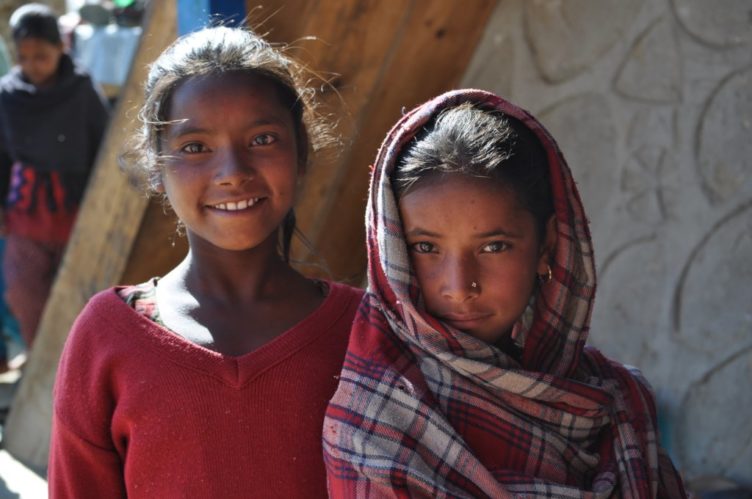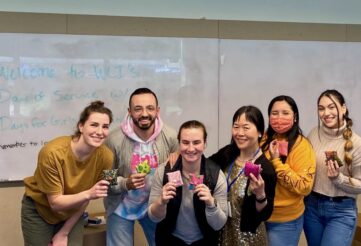Pathways to New Traditions

The road to Kalikot, Nepal is one of the most beautiful in the world …and one of the most dangerous. Days for Girls climbs these stunning mountain paths for an important reason: shattering the shame of menstruation.
In recent months, the outside world has been learning about western Nepal because of chhaupadi, the practice of isolating menstruating women due to the belief that they bring bad fortune. During their monthly periods, girls and women are expected to sleep outdoors in huts or sheds, alone or with the oxen. Nepal's Supreme Court outlawed the practice in 2005, yet in 2011, the United Nations reported an estimated 95% of people were still practicing chhaupadi in the region's Accham DIstrict.
There have been at least six recorded deaths since 2015, as girls and women die of exposure, snake bites, asphyxiation, and other dangers. In December, 15-year-old Roshani Tiruwa died of suffocation while trying to stay warm inside her shed. This despite the fact that her village had been declared “chhaupadi-free” in September 2011; the government had even imposed additional fines for anyone caught breaking the law.
What's the solution? More fines? More jail time? It's easy to judge others, to call for more punitive action — but that clearly isn't working.

Starting With a Conversation
Consider this: everything we associate with blood is illness, injury, or taboo. Like all biological matter, menses are odorous when decomposing. If your community doesn't know what menstrual blood is and doesn't have good menstrual care solutions available, it makes sense that an isolation tradition would develop. And if you truly believed that menstruation would bring illness or bad fortune to our friends and family? Speaking for myself, I know I would be going to a hut to protect them every month; no law or punishment could force me to put them at risk.
So, what is the solution? How can we work with cultures to find paths to new menstrual traditions?
We believe that it starts with a conversation. What if cultural bridging started with an invitation to consider new decisions, instead of shaming? No one likes to be told that what they're doing is wrong. Negative campaigns often backfire, creating a “Romeo and Juliet” kind of divide; suddenly, even practices that had been waning in popularity can become a symbol of autonomy and cultural freedom, rather than about the practice itself.
What if we acknowledge the good intentions of cultural traditions, then ask people to consider other ways to embrace the spirit of their beliefs? Outcomes built on new choices, instead of shame, are more likely to be owned by the community and endure, rather than pushing them to double down in resentment.
Last year, Days for Girls convened a gathering of women and girls in Kalikot to talk about the impact their menstruation had on them. One woman shared, “For five days we are alone. For five days, we eat only dry bread crumbs. For five days, insects bite us and animals bother us. For five days, no one cares.”
After our Days for Girls Nepal team demonstrated the DfG Kit, I asked them how their lives would be different if they each had one? The same woman answered, “Then we would be free.” She and her companions received one the next day, along with medical information about what a period is and how to manage it well, and how to make their own DfG Kit components.
We also gathered the community's leaders, media, and health care workers to discuss the facets of the program, curriculum and DfG Kits. We asked, “What if you ritually cleansed these, and allowed women to go on with their days? The law has not stopped you, but what if you made a new choice?” The leaders agreed. Having their buy-in is an important step.
Shattering the Shame
In my experience, creating an opportunity for consideration is a powerful tool for new cultural opportunities. This process of invitation and conversation instead of intimidation and condemnation, is one that I also have seen also work to amend a culture of female genital cutting in Kisii, Kenya in 2010. But we also need to keep these conversations going. Through these Kalikot women and community leaders, the DfG Nepal Office, and a Soroptomist International grant are the spark that lights our “Shattering the Shame” campaign.
Today, Lila Simkhada, a Kalikot native, leads our Kalikot project. These are her people, this is her language, this is her community. The conversations start with a washable pad they can count on month after month, year after year. They continue because we are talking about shared values of dignity, hope, and opportunity. Chhaupadi is something they can change, together.
How can we help? Since last spring, Days for Girls Nepal has reached over 6,000 women and girls in western Nepal; with more support, our “Shattering the Shame” campaign can reach 20,000 by the end of this summer.
This Thursday, March 8 — International Women’s Day — communities all over the world will be honoring women and championing this year's theme: Press for Progress. At Days for Girls, we also celebrate the tremendous power of conversation. When we come together to talk and listen to girls, women, and each other? We can change the world.
Celeste Mergens is the Founder and CEO of Days for Girls International.









